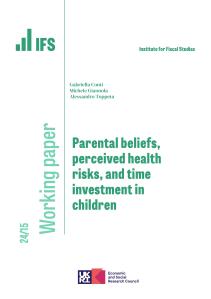<p>This paper was presented at the annual meeting of the American Economic Association, Chicago, January 2012, as part of a session on 'The Impact of Early Cognitive and Non-cognitive Skills on Later Outcomes'.</p><p>When describing the determinants of economic or social outcomes, economists often focus on cognitive skill. Failure to take into account other dimensions of skill may misguide policy design. In this paper, we analyse the consequences and determinants of cognitive and non-cognitive (social) skills at age 7, using data for Great Britain from the National Child Development Study. We find that an overall measure of non-cognitive skills is important for a host of later outcomes, including educational attainment, employment status, wages, smoking, truancy, teenage pregnancy, involvement in crime and health. In many cases, we find that the importance of social skills is greater for individuals from low socio-economic backgrounds than it is for individuals from high socio-economic backgrounds, suggesting that investment in non-cognitive skills may reduce inequality. Finally, our work suggests that social skills may be more malleable than cognitive skills, which - if true - suggests that there may be scope for policy to affect social skills and hence outcomes.</p></p>










